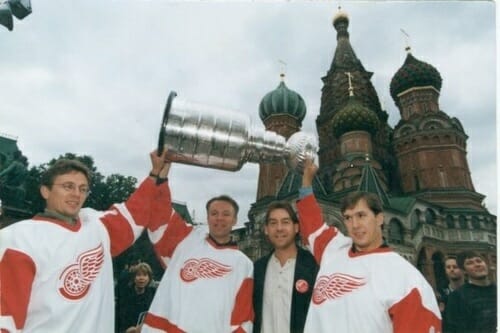The rise of the Detroit Red Wings to the top of the National Hockey League is a well-documented story of success. Some of the greatest players in hockey history donned the Winged Wheel, and they were led by the winningest coach in NHL history, Scotty Bowman.
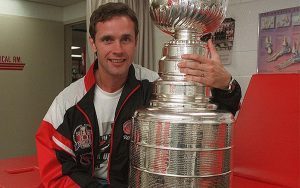
Four Stanley Cup wins, several division titles, scoring records, countless memories, and one long playoff streak became business as usual in the city that quickly became known as “Hockeytown.”
But behind the glow of the well-known names like Yzerman, Bowman, Fedorov, Shanahan, Datsyuk, and so many others, there are those who work tirelessly behind the scenes to keep their team a well-oiled machine. They don’t often receive proper acknowledgment for being part of the life-blood that keeps a franchise going.
John Wharton served as athletic trainer for the Red Wings from 1990 to 2002 and had a first class seat to the team’s pre-2005 lockout glory years. Working with some of the most beloved athletes in Detroit sports history would certainly give anyone some terrific insight into the inner workings of the team, but when you’re responsible for keeping the team healthy and ready to battle every night, your job takes on a whole new meaning – far beyond that of just “trainer.”
[divider] Interview with John Wharton conducted on January 8, 2017[/divider]
MW: What was it that made you want to be an NHL trainer and how did you come to be employed by the Red Wings?
JW: I have always been interested in medicine. While growing up, my girlfriend at the time had two older brothers who were in medical school at Kalamazoo College. From a young age, I was always curious about how things worked and the more I learned about the human body, it kind of snowballed, and that combined with an interest in sports I had growing up. I played football, baseball, and hockey while growing up in Flint. In 1983, sports medicine was just starting to become a ‘thing’ when I was at Central Michigan University. Long story short, while you go through the curriculum and study athletic training at Central, you’ve also got to spend 4-6 hours in the training room every day learning first hand and practicing therapy and training techniques. And after three and a half years, there is a semester long internship. Essentially, you go out to different clinics and hospitals and rank your top three, these clinics and hospitals rank their top 3 candidates and I ended up going to Henry Ford Hospital working for Dr. David Collon, then a team physician for the Lions, Tigers and Red Wings.
MW: How did all of this lead to a job with the Red Wings?
JW: I put myself in the right place at the right time. 1990 came around and I was a certified athletic trainer and strength/conditioning coach, which at that time was a very rare combination. The Red Wings became aware they had a guy with that combination at Henry Ford through Dr. Collon, and that guy was me. I did offseason conditioning with players like Shawn Burr, Steve Yzerman, Gerard Gallant and others. They especially noticed my work with the late Shawn Burr. He had been a bit chubby before and I got him in much better shape for the first time in his career. Then, Brian Murray and Jimmy Devellano invited me to be at the Joe to help rehab the players who weren’t traveling with the team. They liked my work getting players back on the ice quicker than they were used to so I was offered a full-time position.
MW: You had the chance to be around some of the best NHL stars of all time – Steve Yzerman, Sergei Fedorov, Nicklas Lidstrom, Brendan Shahanan, the list goes on. Which player made the biggest impact on you?
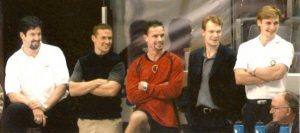
JW: If I had to choose one, which may be impossible…*laughs*… the player who made the biggest impact on me was probably Steve Yzerman. I’ve said it while I worked there and to anyone who would listen since – I think he doesn’t have a neurological system that’s wired the same way as everyone else. When you’re injured, the pain message should be transmitted to and from the brain and register with your body. With Stevie, it seemed that pathway was interrupted somehow because he played through just about any injury you could possibly imagine. It just seemed he was wired a different way, and he had a pain tolerance I haven’t seen before. I put him, Bob Probert and Vladimir Konstantinov at one level in that regard and everyone else slightly below. But in general, hockey players are a different breed as far as toughness. As long as hockey players can breathe and skate, they’ll play.
MW: I still remember watching Detroit’s 2002 playoff run and how Steve Yzerman was essentially playing on one leg, but he didn’t realize at the time just how serious his leg injury was.
JW: His pain tolerance was legendary. At your age, you’re probably too young to remember, but the nets didn’t come off their moorings in the ice back in the early 1980’s. Early in his career, Yzerman slid into the goal post and injured the PCL in his knee, ending his season. Yzerman’s knee had been slowly deteriorating for years before that legendary playoff run in 2002, and the fact that he played over two decades on that bum knee is unreal. But he worked relentlessly on strength and rehab which definitely contributed to his career longevity. Most people don’t put that much thought into it, but he had an injured knee his entire career. It’s pretty crazy, and I feel for him in retirement now and most likely looking at a premature total knee replacement.
MW: I know that I and several other fans would love to know – what was the mood of the team and the inner workings like after the infamous “Fight Night at the Joe?”
JW: Oh definitely. We refer to it by the date ‘March 26th, 1997.’ I’ll never forget it and anyone who was on or part of the team will never either. If you remember the year before that, we won 62 games. That record will never be broken in my opinion, and everyone thought THAT would be the year we’d break the 40-year drought. Obviously, it didn’t happen with losing to the Avalanche in the Western Conference Finals and of course the Draper/Lemieux incident. We also started kind of slow in the 96-97′ season. But that night, March 26th, 1997 and after that it was – the team kind of had an epiphany right then and there. I really think the culture changed in the dressing room, and the aura of the team would be different from then on.
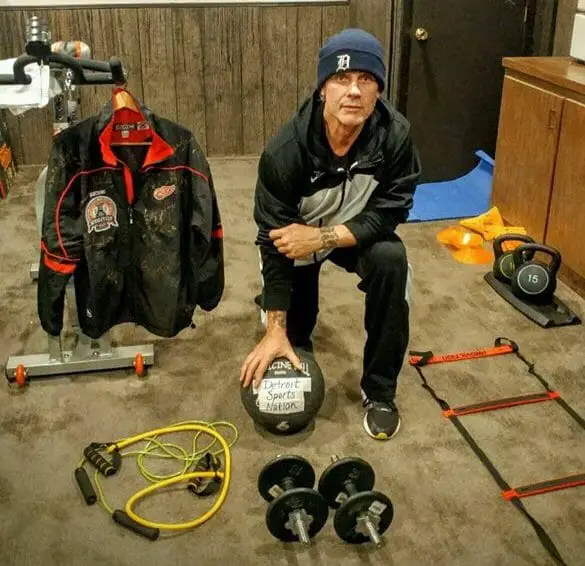
MW: The Red Wings are stuck in a funk right now. Their PP is anemic, several players aren’t scoring, and they’re in serious danger of missing out on the playoffs for the first time in 25 years. Are there any solutions you could offer based on your years of experience with the team?
JW: Man, that’s a tough one. Because where they’re sitting right now, I’m not familiar with it, that far down in the standings. During my time there, we did have bad times – it wasn’t ALL gravy. But we just kept working, and it’s incumbent on the leaders and coaching staff to keep the guys focused in practice, in the weight room, keep their attitudes positive, and everyone just knows you just have to get in. They wouldn’t be the first #8 seed to win. Focus on that, focus on the work you have to do that day. It’s too long a season to put that anchor on yourself and say “we need to be here by this point”. You need to win the next shift, the next period, then the game they’re playing that night, and THEN think about tomorrow. But they also have to do the things individually, taking care of your body, eating right, getting rest and treatment if needed, and prepare in practice as well. At this stage, I’d encourage each player to break the task down into smaller attainable objectives.
MW: Obviously we’re all still upset at the Lions playoff loss to Seattle. I noticed on your Facebook page you had alluded to several times that Red Wings owner Mike Illitch lit into the officials after the Red Wings had been victimized by poor calls, is there a specific instance you can recall?
JW: I think the first time I really remember that happening was after the Lemieux/Draper incident. Mr. Illitch immediately came down to the dressing room to see Draper’s injury. Now, obviously our first concern was Draper’s health, but we could hear through the walls Mr. Illitch really going off on the officials. He saw the damage and tracked down the crew and he really laced into those guys for allowing Lemieux to continue to play in that game.
But there were other times he’d do the same, and they usually involved the Avalanche or another team we were in a battle with in the playoffs. Mr. I was good about picking his spots with that. Scotty Bowman did it too. Everyone knew where the officials dressed, and I think the NHL has cracked down on that. But I witnessed first hand that the players appreciated having an owner like Mr. I who would go to bat for them like that.
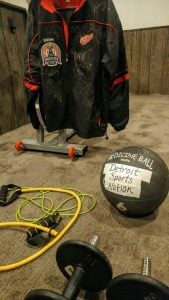 MW: Joe Louis Arena is closing this year and the Red Wings are moving into the brand new Little Caesars Arena for next season. What’s your favorite memory at the Joe and what will you miss most about the old barn?
MW: Joe Louis Arena is closing this year and the Red Wings are moving into the brand new Little Caesars Arena for next season. What’s your favorite memory at the Joe and what will you miss most about the old barn?
JW: The times I’ll cherish most of all are the nights that Stevie hoisted the Cup there. We as staff members also got a chance to hoist the Cup too. My number one memory is the 1997 Stanley Cup win and the team ending the 42-year drought. I remember feeling like that would happen after Darren McCarty’s unbelievable 2nd-period goal that night. That’s when I first got the sense we’d be lifting the Cup later that night.
We repeated as Cup champs the next year, but it was in Washington. I’d say my number two memory is the 2002 Stanley Cup win at Joe Louis Arena in 2002. Any time you’re able to raise the Cup over your head on the ice at Joe Louis is a top memory.
Number three is May 16th, 1996. Not just because Stevie ended a seven-game series against the St. Louis Blues with a laser slapshot in the second overtime, but also because my wife went into labor during the 1st OT. I went right from the Joe to the hospital for the birth of my daughter, Brooke.
And fourth would have to be March 26th, 1997, because like I said, that was an evening and series of events that allowed for number one and two on my list to happen.
MW: In addition to some of the greatest players, you had a chance to be around arguably the greatest coach in sports history. What was it like being around Scotty Bowman?
JW: *Laughs* Oh man, where do I begin? Scotty is very smart. People didn’t give him as much credit as he deserved for his people skills. And by that, I don’t mean his ability to counsel or comfort you – I mean his ability to read you and manipulate you for the greater good of the team. That might sound harsh, but it’s the coaches job to manipulate and motivate you for the greater good of the team. I happen to think at the pro level manipulation is part of coaching, and he was very adept at it. I hadn’t seen someone like him before, and it’s a rare commodity for someone in the coaching world for someone to have those kinds of people skills, and again, I don’t mean socially. He was very good at non-verbal communication. It was a look or his body language – he could tell you a lot of what he thought of your effort, and or lack of. He was our leader from that standpoint, and Steve Yzerman was gifted in that regard as well. He was a man of few words – a look or even a look away. Sometimes, the strongest form of communication is a complete lack of communicating. Shutting someone out was a great way for both of them to get their point across.
MW: John, I appreciate you taking the time to talk and I know our readers are going to appreciate your unique insight into the Red Wings.
JW: Any time, you got it!
[divider]Some perspective from Former Detroit Free Press writer Keith Gave[/divider]
John Wharton certainly made his impact on the inner workings of the Detroit Red Wings, and it definitely didn’t go unnoticed. Former Detroit Free Press writer Keith Gave had a unique perspective that he brought to the readers of Metro-Detroit, and he remembers the impact that Wharton had on the team. Keith began covering the Red Wings in 1985 and left in 1998 to cover the NHL for the Dallas Morning News, and was kind enough to agree to contribute his voice to this piece.
MW: Appreciate you taking the time to lend your perspective to this interview piece. Obviously, you were around the team for a long time, did you know John personally?
KG: I knew John really well, I saw him every day. I started covering the team in 1985-86, and the trainer for the Red Wings at the time was Jim Pengelly.
We had a professional relationship. That was a different time in the NHL – when a player was injured and the coach didn’t have details, he’d say go talk to the trainers. Wharton was very good about briefing us about player injuries and what the recovery time would be and all those kinds of things. That’s changed dramatically and changed in Detroit when Scotty Bowman and everything became a state secret when it came to injuries. They provided as little information as possible – never did Scotty say “go see the trainer,” all that stuff stopped and it was a guessing game. That’s the way it is all through sports now.
MW: Are there any memories you have of his time with the team?
KG: I think you look at his track record getting players back. A lot of the time it has to do with the players but I remember Yzerman missing a big chunk of the season after surgery in his upper back (disc) and he made it back far sooner than everyone expected; you have to give the athletic therapist a lot of credit too.
There’s another well-documented case of Sergei Fedorov playing the playoffs when he didn’t want to play; Slava Fetisov, the way I remember, wanted to convince Sergei he was okay to play. He called Wharton and said we’re taking Sergei out to dinner and then convince him to play, and that’s what he did. He hadn’t planned on playing and there may have been some equipment involved, but they got Sergei out on the ice with Fetisov and Wharton explained he was going to be okay, and that it was an important playoff game.
He was the best player on the ice and helped them win.
MW: Being around the team for so long, were you able to gain an appreciation for the hard work that team trainers routinely do in order to help make the team function?
KG: I think John Wharton was very, very good at what he did with his work with the players. He was highly respected which is very important. It was obvious they trusted him, and players need to trust folks like that. John was really close with the players, he looked after them well and worked closely with Dr. Finley and the medical staff. They all worked together and the attending physicians confirmed that John was good at what he did and very helpful to the players.
I was there when Yzerman wrecked his knee against Buffalo after scoring his 50th goal. He crashed into the net, and they were stationary at the time. He was carted off the ice and after the game, and I remember talking with Jim Devellano and saying he’ll need major reconstructive surgery, out 12-18 months. Mike Illitch intervened and said we’re getting another opinion. They sent Yzerman to see a doctor in Madison, WI – William Clancy – he was the knee guru at the time working with athletes. Clancy decided surgery wasn’t required and that they would re-build the muscles around the knee and play it out that way, and that’s what they did. It took between 4-6 weeks, and it was a remarkable recovery. He wound up coming back and playing in the playoffs that spring when it originally looked like he’d be out over a year. It was Yzerman’s commitment to strengthening his leg. His right knee that was busted was stronger than his left knee, and it gave him problems throughout his career. From the mid 90’s onward, he was playing on one leg. His pain threshold and tolerance was incredible, through the roof – same with Vladimir Konstantinov.
The word on Konstantinov was that if he could walk, he’d play. He was one of the most amazing warriors that we’ll ever see in the history of the game. John saw all of the injuries that Konstantinov had much more than I did. I talked to John over time and they were amazed at what this guy played through. Like Yzerman, his pain threshold was off the charts. He was a born leader of men, like Yzerman.
John Wharton’s name is forever etched in history on the Stanley Cup as a permanent reminder of being part of three championship teams.
He wasn’t scoring goals or making big saves – he was making bigger saves off the ice – helping to keep the beloved athletes we cheer for healthy and ready to battle so that they could do so.
The trainers are the team behind the team, and the team’s success isn’t possible without the training staff.

